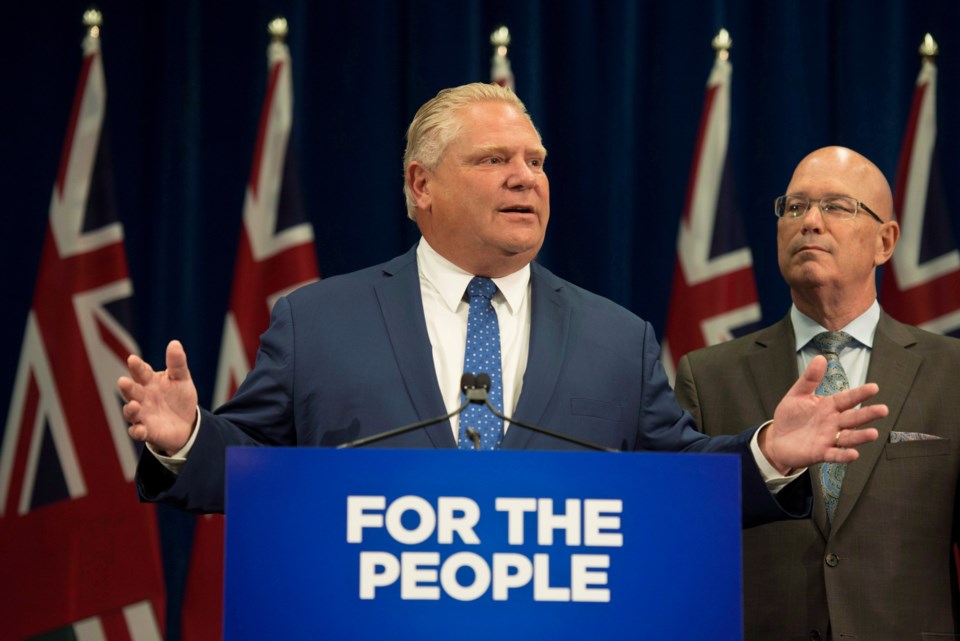Editor's note: This article originally appeared on The Trillium, a Village Media website devoted exclusively to covering provincial politics at Queen’s Park.
The Ford government is giving the mayors of most of Ontario’s big cities — including Barrie Mayor Alex Nuttall — the same “strong mayor” powers it first created for Toronto and Ottawa.
The move will give most of the 29 members of Ontario’s Big City Mayors (OBCM) greater authority over their municipalities on July 1.
As of Canada Day, the strong mayors will have the power to set budgets, veto bylaws, and pass bylaws with just one-third of their council’s support — under the caveat that these bylaws deal with provincial priorities like getting more housing built. They'll also take charge of appointed senior civil servants in their municipalities.
The Ford government first gave Toronto’s and Ottawa’s mayors some of these powers last year with the first non-budgetary nor procedural piece of legislation that it introduced in its second mandate: Bill 3, the Strong Mayors, Building Homes Act. At the time, Premier Doug Ford said the two cities would be a “test area” for potential expansion.
Ford and Municipal Affairs and Housing Minister Steve Clark have said they’ve given more authority to mayors to better enable them to hit their housing targets. One of the Progressive Conservative government’s top priorities is to facilitate 1.5 million homes being built in Ontario by the end of 2031, which its housing affordability task force said is needed to address the province’s supply shortage.
Each of the 26 new “strong mayors” announced by Clark on Friday submitted a “housing pledge” to the province, affirming their co-operation with the province’s housing targets and plans.
Sudbury, Thunder Bay and Chatham-Kent, the remaining OBCM municipalities without the powers, will have the opportunity to submit a housing pledge to the province to receive the powers, Clark said on Friday.
“Pledges may include, but are not limited to, priorities for site-specific planning decisions to expedite housing in priority areas, plans to streamline the development approval process, commitments to plan, fund and build critical infrastructure to support housing, and strategies to use municipal surplus lands,” according to the province’s regulatory posting.
One of the municipalities that will be left without “strong mayor” powers come July is Newmarket. Mayor John Taylor didn’t agree to the Ford government’s housing pledge, said Clark.
Taylor argued the city doesn’t have enough sewage capacity to meet the province’s 12,000 homes goal.
“I agree with the province (that) we need to build more housing,“ Taylor told The Trillium in an interview. “But our wastewater infrastructure constraint is just an engineering fact.”
“The irony here…of course, is that the province hasn't signed off on” an environmental assessment for a new proposed treatment plant, Taylor said. The land’s been purchased, the engineering work is done, but there’s no official sign-off yet, according to Newmarket’s mayor.
He noted he’s been in touch with provincial officials and they’re working toward a solution.
The 26 municipalities the Ford government is expanding “strong mayor” powers to are: Ajax, Barrie, Brampton, Brantford, Burlington, Caledon, Cambridge, Clarington, Guelph, Hamilton, Kingston, Kitchener, London, Markham, Milton, Mississauga, Niagara Falls, Oakville, Oshawa, Pickering, Richmond Hill, St. Catharines, Vaughan, Waterloo, Whitby, and Windsor.
In doing so, the province has essentially put itself in a “no-lose position when it comes to home-building targets,” said Mike Moffatt, an economist and senior director of the Smart Prosperity Institute, in a tweet.
“If (municipalities) meet (those targets), fantastic, but if they don’t, it allows the premier to say, ‘I gave cities all the powers they needed — they just refused to use ‘em,’” Moffatt added.
Some mayors, including Ottawa’s Mark Sutcliffe, promised not to use the powers. Several councillors from across the province have said the move is undemocratic and urged their mayors to reject them.
Reacting after the announcement on Friday, NDP MPP Chris Glover called the government’s move a “power grab” by Ford.
“This is about Doug Ford having the power to govern municipalities from Queen’s Park, and that’s the real danger of what the government is doing today,” Glover said.

